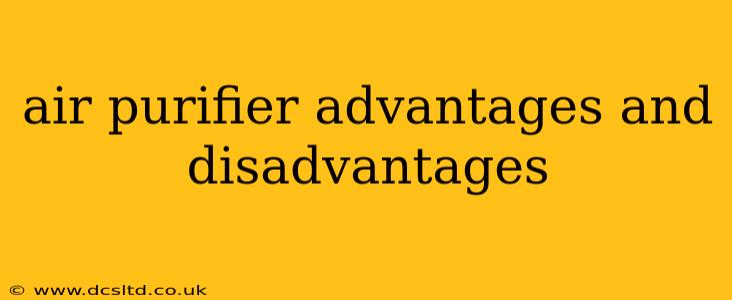Air purifiers have become increasingly popular in homes and workplaces, promising cleaner, healthier air. But are they all they're cracked up to be? This comprehensive guide will delve into the advantages and disadvantages of air purifiers, helping you decide if one is right for you.
Advantages of Using an Air Purifier
Air purifiers offer a multitude of benefits, impacting both your health and the overall environment of your home or office. Let's explore some key advantages:
Improved Air Quality: The Primary Benefit
This is the most obvious advantage. Air purifiers effectively remove various pollutants from the air, including dust, pollen, pet dander, mold spores, smoke, and volatile organic compounds (VOCs). Breathing cleaner air directly contributes to better respiratory health, especially beneficial for those with allergies, asthma, or other respiratory conditions. Many modern purifiers also boast HEPA filters capable of trapping even microscopic particles.
Allergy and Asthma Relief
For individuals suffering from allergies or asthma, an air purifier can be a game-changer. By significantly reducing airborne allergens, air purifiers can alleviate symptoms such as sneezing, coughing, wheezing, and itchy eyes. This can lead to improved sleep quality and overall well-being.
Reduced Exposure to Pollutants
Air purifiers don't just target allergens; they also help reduce exposure to harmful pollutants like VOCs released from cleaning products, furniture, and building materials. These pollutants can contribute to various health problems, making air purification a crucial step in creating a healthier indoor environment.
Odor Removal
Many air purifiers include activated carbon filters that effectively absorb odors from cooking, pets, and other sources. This can lead to a fresher, more pleasant-smelling home.
Improved Sleep Quality
Breathing cleaner air can significantly improve sleep quality. Reduced exposure to allergens and irritants can lead to less coughing, sneezing, and congestion, allowing for more restful sleep.
Disadvantages of Using an Air Purifier
While air purifiers offer many benefits, it's essential to consider their potential drawbacks:
Cost: Initial Investment and Ongoing Maintenance
Air purifiers range in price from budget-friendly to high-end models. The initial investment can be significant, depending on the features and size of the unit. Furthermore, you'll need to factor in the ongoing cost of replacing filters, which can add up over time.
Noise Level: Some Models Can Be Loud
Some air purifiers, especially those with powerful motors, can be quite noisy. This can be disruptive, particularly during sleep. It's crucial to check the decibel rating before purchasing.
Maintenance: Regular Filter Changes Are Essential
Regular filter replacement is vital for maintaining the purifier's effectiveness. Failing to do so will reduce its performance and may even lead to the release of trapped pollutants back into the air.
Space Requirements: They Take Up Physical Space
Air purifiers require physical space, which can be a concern in smaller rooms or apartments. Consider the unit's size and placement before purchasing.
Potential for Ozone Emission (In Some Models)
Some older or lower-quality air purifiers may emit ozone, a harmful pollutant. Look for models certified by reputable organizations that ensure ozone-free operation.
Energy Consumption: Can Add to Your Electricity Bill
Air purifiers consume electricity, adding to your energy bill. While the energy consumption is generally low, it's still a factor to consider.
Frequently Asked Questions (PAA)
What size air purifier do I need for my room?
The ideal size depends on the room's square footage. Most manufacturers provide guidelines on their product pages to help you determine the appropriate coverage area. Consider factors like ceiling height and the number of occupants when making your choice.
How often should I change my air purifier filter?
Filter replacement frequency varies depending on the type of filter, the air quality in your home, and the purifier's usage. Check the manufacturer's recommendations, but generally, you'll need to replace filters every 3-6 months. Some purifiers will have indicators to alert you when it's time.
Are air purifiers effective against viruses?
While air purifiers aren't designed to eliminate viruses entirely, some models with HEPA filters can remove virus-carrying particles from the air, potentially reducing the risk of transmission. This is an area of ongoing research, however.
Can air purifiers remove pet odors?
Yes, many air purifiers with activated carbon filters are effective at removing pet odors. The activated carbon absorbs the odor-causing molecules, leaving your home smelling fresher.
Do I need an air purifier if I don't have allergies?
Even if you don't have allergies, an air purifier can still be beneficial. It can remove pollutants like dust, smoke, and VOCs, creating a healthier indoor environment for everyone.
This guide provides a thorough overview of the advantages and disadvantages of using an air purifier. Ultimately, the decision of whether or not to invest in one depends on your individual needs and circumstances. Weigh the pros and cons carefully, and consider consulting with an allergist or healthcare professional if you have specific health concerns.
